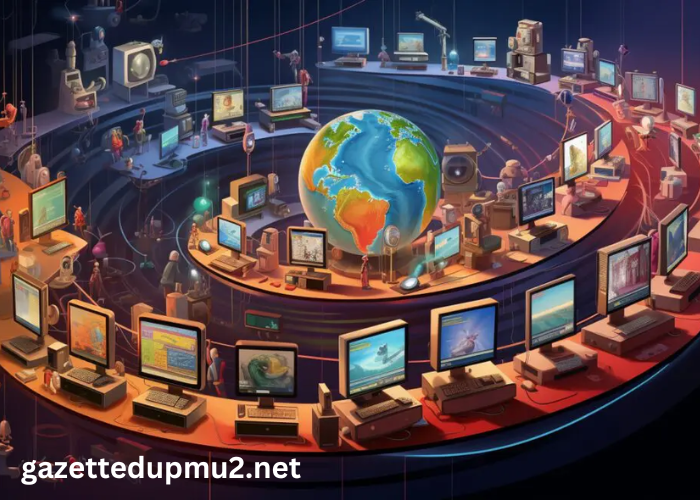In the ever-evolving landscape of technology, there are certain breakthroughs and innovations that stand out as game-changers. These are the technologies that not only disrupt industries but also reshape the way we live, work, and interact with the world. From the advent of the internet to the proliferation of artificial intelligence, these “Tech Titans” have left an indelible mark on society. In this article, we will explore some of the most significant game-changing technologies of recent times and the impact they have had on our lives.
The Internet: Connecting the World
The internet is arguably the most transformative technology of the modern era. Its impact on nearly every aspect of our lives is immeasurable. In the span of a few decades, the internet has gone from a research project to an integral part of our daily existence.
The internet has connected people across the globe, enabling instant communication and the exchange of information on an unprecedented scale. It has revolutionized industries like commerce, entertainment, and journalism. Online marketplaces like Amazon and Alibaba have disrupted traditional retail, while streaming platforms like Netflix and YouTube have transformed the way we consume media.
Moreover, the internet has democratized information, making knowledge accessible to anyone with a connection. It has empowered individuals and communities to share their stories, advocate for social causes, and challenge established norms. Social media platforms like Facebook, Twitter, and Instagram have become platforms for self-expression and activism.
The internet has also transformed the workplace, enabling remote work and collaboration. Tools like Zoom and Slack have become indispensable in the post-pandemic era, redefining how businesses operate.
Artificial Intelligence: The Power of Machines to Learn
Artificial Intelligence (AI) is another Tech Titan that has made a profound impact on various industries. AI refers to the simulation of human intelligence in machines, allowing them to learn from data, make decisions, and perform tasks that typically require human intelligence.
Machine Learning, a subset of AI, has enabled breakthroughs in fields such as healthcare, finance, and autonomous vehicles. In healthcare, AI algorithms can analyze medical images, assist in drug discovery, and predict patient outcomes. AI-powered financial models are used for risk assessment and fraud detection. Self-driving cars use AI to navigate and make split-second decisions.
One of the most visible applications of AI is in virtual assistants like Siri, Google Assistant, and Alexa. These AI-powered devices have changed the way we interact with technology, allowing us to control our homes, search the web, and perform tasks using voice commands.
AI has also revolutionized customer service through chatbots and virtual agents. These systems can provide instant responses to customer inquiries, improving efficiency and customer satisfaction.
In the realm of entertainment, AI is used to create realistic computer-generated imagery (CGI) and enhance video games. AI algorithms can generate music, art, and even write content. They have the potential to automate various creative processes, raising questions about the future of work in creative industries.
Blockchain: Decentralizing Trust
Blockchain technology burst onto the scene with the advent of cryptocurrencies like Bitcoin. However, its implications go far beyond digital currencies. Blockchain is a distributed ledger that records transactions across a network of computers. It offers security, transparency, and decentralization.
One of the key features of blockchain is its ability to create trust in a trustless environment. Traditional financial systems rely on intermediaries like banks to validate transactions. In contrast, blockchain eliminates the need for intermediaries, allowing parties to transact directly with one another. This has the potential to disrupt industries like finance, real estate, and supply chain management.
In finance, blockchain has given rise to the concept of decentralized finance (DeFi). DeFi platforms enable peer-to-peer lending, borrowing, and trading of digital assets without the need for traditional banks. This opens up financial services to a global audience and reduces barriers to entry.
Blockchain also has the potential to transform supply chain management. It allows for end-to-end visibility and traceability of products. This is particularly important in industries where transparency and accountability are crucial, such as food and pharmaceuticals.
Moreover, blockchain has the potential to revolutionize the way we vote in elections, reducing the risk of fraud and increasing participation. It can also be used to secure intellectual property rights and ensure fair compensation for content creators in the digital age.
Renewable Energy: Powering the Future Sustainably
The global push towards sustainability and environmental responsibility has given rise to another Tech Titan: renewable energy technologies. Fossil fuels have long been the dominant source of energy, but their environmental impact and finite supply have driven the search for alternative energy sources.
Solar and wind power are at the forefront of the renewable energy revolution. Solar panels convert sunlight into electricity, while wind turbines harness the kinetic energy of the wind. Both technologies have made significant advancements in efficiency and cost-effectiveness, making them viable alternatives to traditional energy sources.
The impact of renewable energy extends beyond environmental benefits. It has the potential to reshape the global energy landscape, reduce dependence on fossil fuels, and increase energy security. Additionally, the decentralization of energy production through rooftop solar panels and small-scale wind turbines empowers individuals and communities to generate their own electricity.
Energy storage technologies, such as advanced batteries, are a crucial component of the renewable energy ecosystem. They allow excess energy generated during sunny or windy periods to be stored and used when needed. This addresses one of the main challenges of renewable energy: intermittency.
The adoption of electric vehicles (EVs) is also driving the demand for renewable energy. EVs offer a more sustainable mode of transportation and rely on electricity for power. As the EV market grows, so does the need for clean energy sources to charge these vehicles.
Quantum Computing: Unlocking Unprecedented Power
Quantum computing represents a paradigm shift in computing power. Traditional computers use bits, which can represent either a 0 or a 1. Quantum computers use quantum bits or qubits, which can represent 0, 1, or both simultaneously, thanks to the principles of superposition and entanglement.
This quantum phenomenon allows quantum computers to perform certain types of calculations exponentially faster than classical computers. Quantum computing has the potential to revolutionize fields such as cryptography, materials science, drug discovery, and optimization.
In cryptography, quantum computers pose a threat to traditional encryption methods. They can factor large numbers rapidly, potentially breaking widely used encryption algorithms. This has led to the development of post-quantum cryptography, which aims to create encryption methods resistant to quantum attacks.
Quantum computing can also accelerate the discovery of new materials with desirable properties. This has applications in industries ranging from electronics to pharmaceuticals. Drug discovery, in particular, stands to benefit from quantum computing’s ability to simulate complex molecular interactions.
Furthermore, quantum computing has the potential to revolutionize optimization problems. It can quickly find the best solutions to complex logistical and scheduling challenges. This has applications in supply chain management, transportation, and finance.
5G Technology: Connecting Everything, Everywhere
The rollout of 5G technology has ushered in a new era of connectivity. 5G, or the fifth generation of wireless technology, promises faster speeds, lower latency, and the ability to connect a vast number of devices simultaneously. This technology is not merely an evolution of its predecessors; it is a fundamental leap forward.
The increased speed and reduced latency of 5G have the potential to transform industries such as healthcare, autonomous vehicles, and the Internet of Things (IoT). In healthcare, doctors can perform remote surgeries with real.





